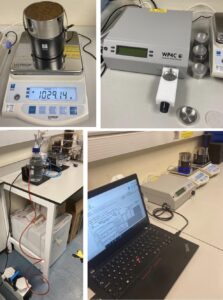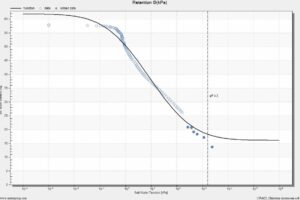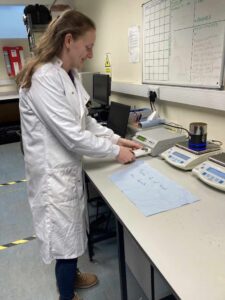From tropical forests to temperate crops, while chasing soil moisture
Author: Louise Gill, Research technitian at Lancaster University
Hi I’m Louise and I am Lancaster’s Research Technician for soil and water in the SHui project. I started the role at the end of 2021, once Cristina transitioned to a PhD, with the arrival of new METER equipment (HYPROP2, its refill unit, and WP4C). My role has mainly been to set up and understand this equipment to produce soil moisture release curves to understand the impacts of different soil management, including trying to discriminate bulk soil versus rhizosheath hydraulic properties.
This equipment is a game changer (figure 1).

It allows high-resolution soil moisture release curves (below, figure 2) to be produced in a fraction of the time compared to the old methods. Hyprop Fit creates other graphs including weight change over time, conductivity of the Hyprop measurements against soil water tension, and Conductivity (Ktheta) of the Hyprop measurements against volumetric water content. The software fits various hydrological models, which allows the best fit to be chosen.

I’ve collected data that show the soil’s permanent wilting point , which can help land owners determine the correct land management for crops and save water resources from irrigation when it is not required.
I gained a first-class honours degree in Environmental Science from Lancaster University in 2010, where I studied a variety of subjects including hydrology, pollution and soils. My undergraduate dissertation saw me visiting a tropical rainforest in Borneo to measure soil moisture content. During my degree I also volunteered to undertake research in South Africa into small mammals and birds with Operation Wallacea over a summer.
After my degree I started working in a business development department for a grounds maintenance, cemetery management, arboriculture and horticultural company. Here I expanded my knowledge into the improvements environmental research can bring for these businesses by better managing our environment e.g. watering regimes and choice of grass species. Learning about current best practice procedures for maintenance/work made me want to go back into research.
In 2017-2020, while my children were young, I completed my part-time Masters by Research. I looked at how tree canopies can reduce the rainfall that reaches the ground via wet canopy evaporation and therefore reduce flooding risks to communities. I found that trees on the edge of stands can play a large role in reducing the water that reaches the ground in small-medium sized rain events, but they have less effect for large events. Also, trees on the edge collected more rainfall than the area they covered during certain conditions e.g. when the wind direction was towards the open canopy.
I went on to work for the RSPB as a Senior Administrator for the North West region where I saw the benefits that research in partnership with farmers/landowners can make to our environment and the farmers. I wanted to be more involved in the research itself and became Assistant Conservation Officer covering maternity leave where I collated wader survey data and wrote farm wader reports.
From the roles I have undertaken, I have seen the benefits that interdisciplinary research can make to our environment and have an interest in water/soil science. I live in a village where I see local farm land being degraded over winter with no cover crops after maize harvesting, and wanted to be able to work towards providing methods to improving practices to protect the valuable soil and our landscape.
Since starting the Research Technician role, I have learnt more about soil water and various ways of measuring its availability to the plant. It has been interesting to focus on plants/crops and know how this can benefit our planet by maximising water resources for food production. I enjoy collecting data and I hope to be able to continue as a Research Technician in a similar field in the future.

